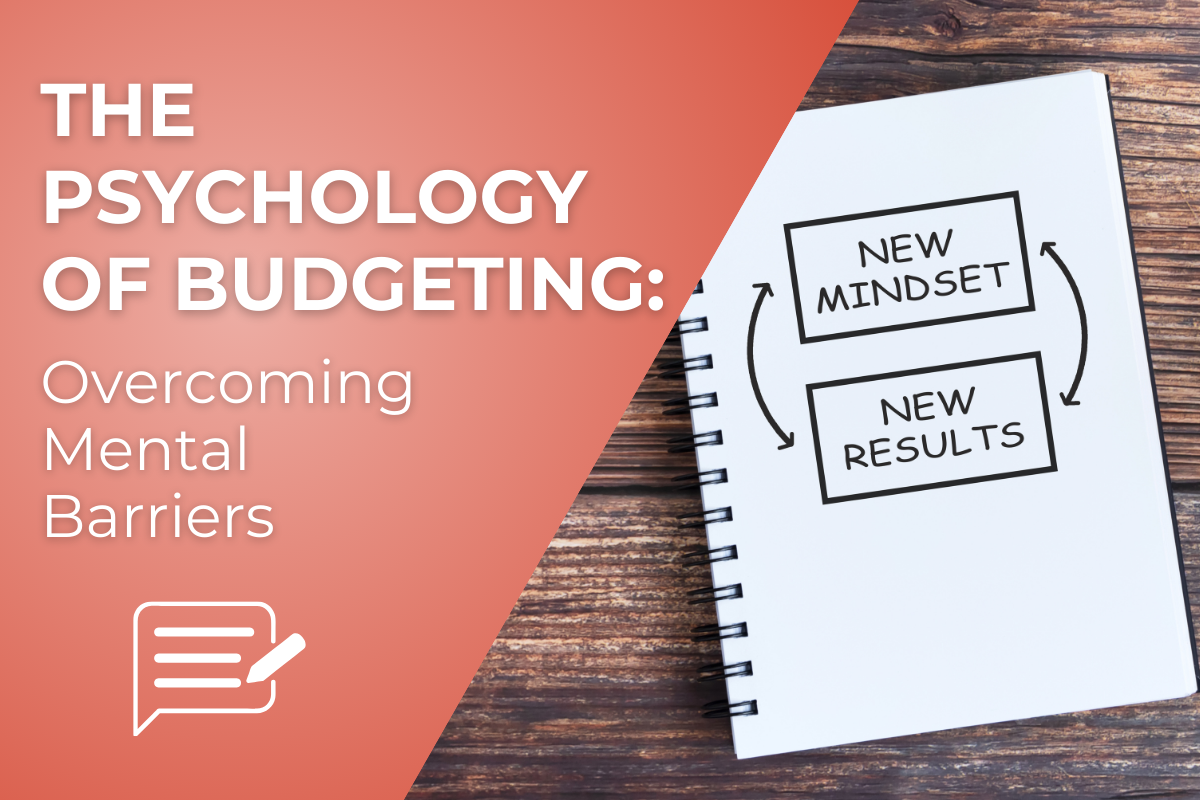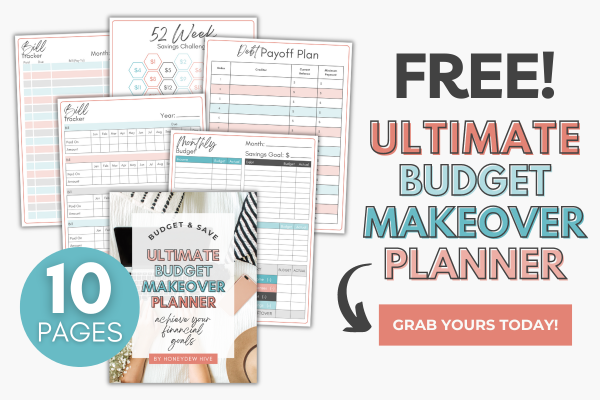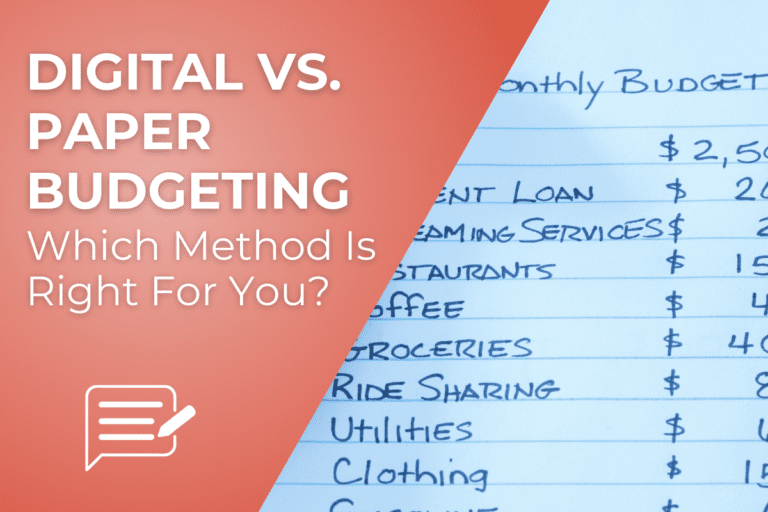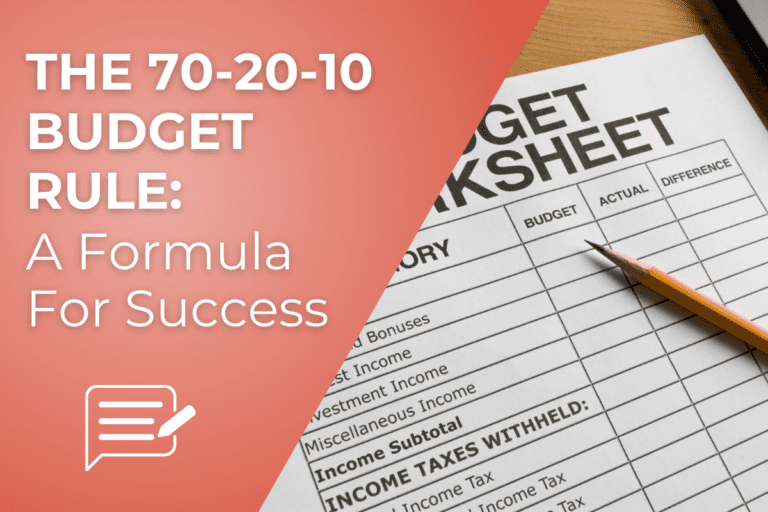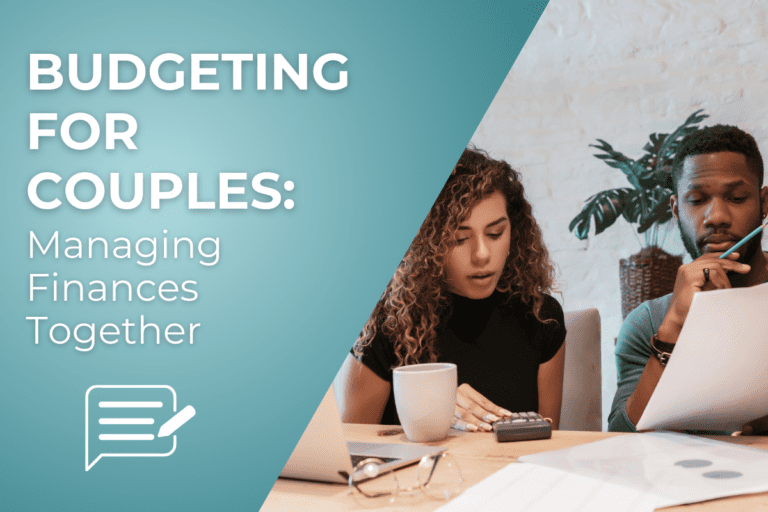We partner with some awesome companies that offer products that help our readers achieve their goals! If you purchase through our partner links, we get paid for the referral at no additional cost to you! Read our disclosure for more information.
Budgeting isn’t just about numbers—it’s about mindset!
Many people struggle with budgeting due to mental barriers that can be challenging to overcome.
Did you know that 40% of Americans say they have difficulty sticking to a budget?
This isn’t because they lack the ability to budget, but rather because their mental approach to money management needs a little tweak.
The psychology of budgeting dives deep into how our thoughts, emotions, and behaviors influence our financial decisions.
Whether you feel overwhelmed by the idea of budgeting, lack confidence in managing your money, or struggle with instant gratification, understanding these psychological aspects can make a significant difference.
Let’s explore these mental barriers and discover practical strategies to help you conquer them.
Together, we’ll transform your financial mindset and set you on the path to success!
Understanding The Psychology Of Budgeting
Budgeting isn’t just about adding up numbers; it’s about how we think and feel about money.
The psychology of budgeting helps us understand why we make the choices we do with our money.
By understanding these reasons, we can get better at budgeting and reach our financial goals.
Definition & Importance Of Budgeting
Budgeting means planning how to spend and save your money.
It’s like making a map that shows where your money goes each month. This helps you make sure you have enough for the things you need and want.
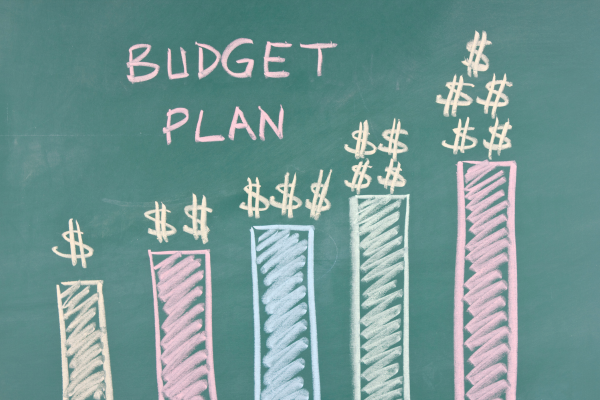
Budgeting is important because it helps you avoid spending too much and getting into debt.
Common Psychological Barriers To Budgeting
Many people have mental barriers that make budgeting hard. These barriers are often feelings and thoughts that stop us from managing our money well.
Here are some common ones:
- Fear of Facing Financial Reality: Some people are scared to look at their finances because they worry it will be bad news. This fear can stop them from even starting a budget.
- Overwhelm and Stress: Budgeting can feel overwhelming, especially if you don’t know where to start. This stress can make it hard to take the first step.
- Lack of Financial Literacy and Confidence: If you don’t know much about money or feel unsure about how to handle it, budgeting can seem impossible.
- Instant Gratification vs. Long-term Goals: Sometimes, we want to buy right now instead of saving for the future. This need for instant gratification can make it hard to stick to a budget.
The Impact Of Emotions On Financial Decisions
Our emotions play a big role in how we handle money. When we feel happy, sad, or stressed, we might spend money differently.
For example, some people shop to feel better when they’re sad, which can lead to overspending.
Understanding how emotions affect your spending can help you make better financial choices.
By recognizing these psychological barriers and how emotions impact our financial decisions, we can start to change our behavior.
The first step to better budgeting is to become aware of these issues and be honest with ourselves about how we handle money.
Budgeting isn’t just a financial tool; it’s a way to take control of your life and reduce stress.
When you understand the psychology behind it, you can tackle your budgeting challenges more effectively and create a plan that works for you.
Common Mental Barriers To Budgeting
When it comes to budgeting, many people face mental barriers that make it hard to manage their money. Let’s look at some of the most common mental barriers and understand why they happen.
Fear Of Facing Financial Reality
One big barrier is fear.
Many people are afraid to look at their finances because they worry it will be bad news. This fear can stop them from even starting a budget.
It’s like being scared to go to the doctor because you might hear something you don’t want to hear.
But remember, knowing your financial situation is the first step to improving it!
Overwhelm & Stress Related To Budgeting
Budgeting can feel overwhelming, especially if you don’t know where to start. The idea of tracking every dollar can be stressful.

When you’re stressed, it’s easy to avoid budgeting altogether. But breaking the process into smaller steps can make it easier and less stressful.
Lack Of Financial Literacy & Confidence
Another common barrier is not knowing enough about money.
If you don’t understand financial terms or feel unsure about how to handle money, budgeting can seem impossible. This lack of confidence can make you feel like you’re not capable of managing your finances.
But with a little learning and practice, anyone can become good at budgeting!
Instant Gratification vs. Long-term Goals
We all like to enjoy things now, but sometimes that gets in the way of our long-term goals.
Instant gratification means wanting to buy something right now instead of saving for the future. This can make it hard to stick to a budget.
It’s like choosing a cookie now instead of waiting for a whole cake later. But learning to balance present wants with future needs is key to successful budgeting.
Understanding these common mental barriers to budgeting can help you see why budgeting might be hard for you and recognizing these barriers is the first step to overcoming them.
With the right mindset and tools, you can break through these barriers and take control of your finances!
Strategies To Overcome Mental Barriers
Overcoming mental barriers to budgeting can seem tough, but with the right strategies, you can do it!
Here are some simple and effective ways to tackle those barriers and improve your financial mindset.
Setting Realistic & Achievable Goals
Start by setting small, realistic goals that are easy to achieve.
Instead of aiming to save a huge amount right away, set a goal to save a small amount each week. Achieving these small goals can build your confidence and motivate you to keep going.
For example, start with saving $10 a week and gradually increase it as you get more comfortable with budgeting.
Creating A Positive Financial Mindset
Changing how you think about money can make a big difference. Instead of seeing budgeting as a chore, try to view it as a way to take control of your life and reach your dreams.
Remind yourself of the benefits of budgeting, like being able to afford a fun vacation or saving for a new car.
Positive thinking can help you stay motivated and focused on your financial goals.
Utilizing Tools & Resources For Budgeting
There are many tools and resources available to make budgeting easier.
Use apps that can track your spending and help you create a budget. Many of these apps are free and user-friendly, making it simple to monitor your finances.
You can also find online courses or books that teach budgeting basics and offer tips for managing money effectively.
Building A Support System For Accountability
Having a support system can help you stay on track with your budgeting goals.
Share your goals with a friend or family member who can encourage you and hold you accountable.
You can also join online communities or groups where people share their budgeting successes and challenges. Being part of a supportive community can make the process more enjoyable and less isolating.

By using these strategies, you can overcome the mental barriers that make budgeting difficult.
Remember, it’s okay to take small steps and make gradual changes. The important thing is to start and keep moving forward.
With time and practice, budgeting will become a natural part of your routine, and you’ll feel more confident and in control of your finances.
The Role Of Habits & Behavior In Budgeting
Habits and behavior play a huge role in how we manage our money. Understanding and changing your habits can make budgeting easier and more effective.
Let’s explore how habits affect budgeting and what you can do to build better financial habits.
How Habits Influence Financial Decisions
Our daily habits greatly influence our financial decisions. Small, everyday choices like buying coffee or eating out can add up over time.
These habits can either help you save money or lead to overspending. Recognizing these habits is the first step to making better financial decisions.
For example, if you realize you’re spending a lot on takeout, you can start cooking more at home to save money.
Techniques To Build Positive Financial Habits
Building positive financial habits takes time and effort, but it’s worth it! Here are some techniques to help you get started:
- Start Small: Begin with one small change, like saving a few dollars each week. As this becomes a habit, you can gradually increase the amount.
- Set Reminders: Use apps or sticky notes to remind you of your financial goals. Seeing these reminders regularly can help reinforce positive habits.
- Reward Yourself: Give yourself a small reward when you stick to your budget. This can motivate you to keep going and make budgeting feel more rewarding.
The Power Of Small, Consistent Changes
Making small, consistent changes is more effective than trying to overhaul your finances all at once.
For example, if you want to save more, start by cutting out one small expense, like a daily coffee shop visit. Over time, these small savings can add up to a significant amount.
Consistency is key—stick with these small changes, and you’ll see big results.
By understanding the role of habits and behavior in budgeting, you can take control of your finances.
Small changes can lead to big improvements in your financial health. Focus on building positive habits and making consistent, manageable changes.
Soon, you’ll find that budgeting becomes easier and more natural, helping you reach your financial goals!
Practical Tips For Successful Budgeting
Budgeting doesn’t have to be complicated or stressful. With a few practical tips, you can create a budget that works for you and helps you reach your financial goals.
Here are some easy-to-follow steps to get started and stay on track.
Step-by-Step Guide To Creating A Budget
Creating a budget is like making a plan for your money. Here’s a simple step-by-step guide to help you start:
- List Your Income: Write down all the money you earn each month, including your salary, side jobs, and any other income.
- Track Your Expenses: Keep track of all your spending for a month. This includes bills, groceries, entertainment, and any other expenses.
- Categorize Your Spending: Group your expenses into categories like housing, food, transportation, and entertainment. This helps you see where your money is going.
- Set Spending Limits: Decide how much you want to spend in each category. Make sure your total spending is less than your income.
- Adjust as Needed: If you’re spending too much in one category, find ways to cut back. Move some money around to make sure everything balances.
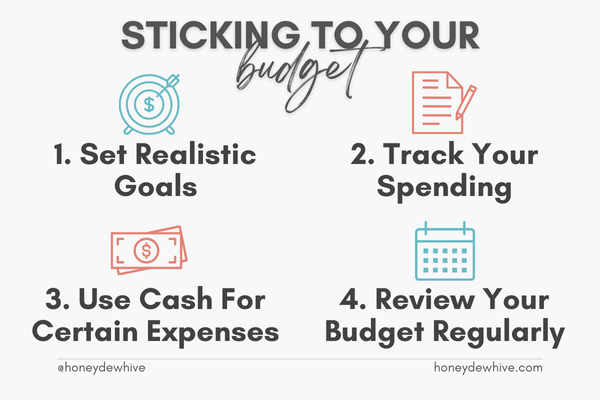
Tips For Tracking Expenses & Staying Organized
Staying organized is key to successful budgeting. Here are some tips to help you keep track of your expenses:
- Use Budgeting Apps: There are many apps available that can help you track your spending and stay organized. Find one that works for you and use it regularly.
- Keep Receipts: Save your receipts and review them at the end of each week. This helps you see exactly where your money is going.
- Set a Weekly Check-In: Take a few minutes each week to review your budget and make sure you’re staying on track. Adjust your spending if needed.
Adjusting Your Budget As Life Changes
Life is always changing, and your budget should change with it. Here’s how to adjust your budget when things change:
- Review Regularly: Check your budget every few months to see if it still fits your life. If you get a raise, have a new expense, or your goals change, adjust your budget accordingly.
- Be Flexible: Don’t be afraid to make changes. If something isn’t working, try a new approach. Your budget should work for you, not against you.
RECOMMENDED READ: HOW TO CREATE A MONTHLY BUDGET THAT ACTUALLY WORKS
Celebrating Milestones & Staying Motivated
Celebrating your successes can keep you motivated. Here are some ways to stay inspired:
- Set Milestones: Break your goals into smaller milestones. For example, if you want to save $1,000, celebrate when you reach $100, $500, and so on.
- Reward Yourself: Give yourself a small reward when you reach a milestone. It doesn’t have to be expensive—just something that makes you happy and keeps you motivated.
By following these practical tips, you can create a successful budget that helps you manage your money and achieve your financial goals.
Remember, budgeting is a journey, not a one-time task. Stay flexible, keep track of your progress, and celebrate your successes along the way!
Final Thoughts
Budgeting success starts in the mind. By understanding the psychology of budgeting and implementing these strategies, you can overcome mental barriers and take control of your finances.
Remember, it’s a journey, not a destination. Stay positive, stay committed, and watch your financial health improve!
Overcoming these mental barriers is crucial for long-term financial success. It’s about developing a mindset that supports your goals and helps you make informed, confident decisions.
Keep in mind that setbacks are a natural part of the process. Use them as learning experiences to refine your approach and strengthen your resolve.
By setting realistic goals, leveraging helpful tools, and fostering positive habits, you can transform your relationship with money.
Celebrate your progress along the way, no matter how small, and stay motivated by the tangible improvements in your financial health.
So, take that first step today. Embrace the psychology of budgeting, and empower yourself to achieve the financial freedom you’ve always dreamed of.
Your future self will thank you!
Want More Honeydew Hive?
If you enjoyed this article and want more helpful advice and inspiration, be sure to subscribe to Honeydew Hive for even more great content!
When you subscribe, you’ll receive our free Ultimate Budget Makeover Planner – the exact roadmap I used to pay off over $30K in debt!
Stay tuned for more tips, inspiration, and practical advice to make managing your finances easier and more enjoyable. Don’t miss out – subscribe now and join the Honeydew Hive community!

